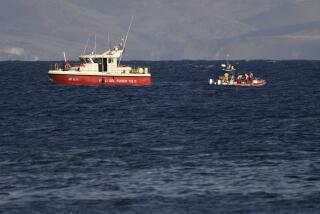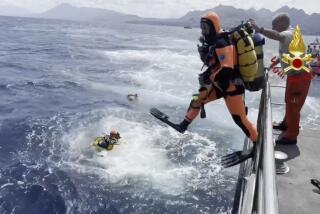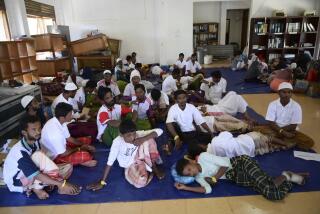Capsized ship brought to shore, next of kin seek answers in China disaster
Reporting from Beijing — More than 1,000 people whose relatives were presumed lost aboard a capsized Chinese cruise ship converged on towns near the sinking site, seeking answers about the disaster and offering DNA samples to help identify corpses.
The boat was pulled out of the water Friday and brought to shore. A team of at least 100 workers wearing white protective suits stood ready to enter the ship and begin recovering bodies once officials declared it safe.
The official death toll climed to 102 on Friday.
Recovery workers worked to lift the submerged ship upright using two large, barge-borne cranes as hope of finding survivors slipped away, at one point turning the vessel 90 degrees onto its side. Searchers also stretched a net about 500 yards downstream to catch anything that spilled out.
“There is slim chance that we will find more survivors inside the hull,” said Xu Chengguang, a spokesman for the Transportation Ministry. “We have made the general judgment that there is no possibility of survival.”
Xu said the decision would help find the missing “in the shortest possible time” and “protect the dignity of the deceased.”
On Thursday, about 200 taxis and 1,500 private vehicles with yellow ribbons tied to their side-view mirrors were organized into a volunteer fleet to greet arriving family members at highway toll plazas and other transport junctions in Jianli county, south of Wuhan in Hubei province.
A number of hotels said they were offering free accommodations to relatives, and police called on locals with available rooms to volunteer whatever space they had. But some next of kin complained that they had not been allowed to visit the sinking site and were essentially trapped in their hotel rooms, watching state-run TV and surfing the Internet for the latest news, without any special briefings.
“Five members of my family are there, but they can’t go to the rescue site. People take them out to eat, to ‘keep them company,’ but I think they want to keep a close eye on them,” said Lin Li, 20, whose grandfather, Lin Weizhu, was aboard the vessel. “They are recovering more bodies each day but they haven’t released any names, so it’s not clear who is dead.”
Authorities on Friday raised the confirmed death toll to 102 and said 14 survivors had been found from the Eastern Star, which sank in the Yangtze River on Monday night with 458 people aboard amid bad weather en route from Nanjing to Chongqing.
More than 340 corpses may still be aboard the ill-fated vessel. Late Wednesday, rescue workers cut several holes into the hull in hopes of discovering survivors trapped in air pockets, but found none.
State-run media have taken pains to emphasize the governmental response, noting Thursday that the Politburo Standing Committee had convened a special meeting on the disaster, overseen by President Xi Jinping. The central government said it had appropriated $1.6 million (10 million renminbi) as a special emergency fund to support the rescue and recovery operations.
But family members desperate for answers have clashed with local officials in Shanghai and other cities, complaining they have been denied timely information about the capsized ship. State-run CCTV said 1,200 relatives had arrived in the Jianli area as of midafternoon Thursday.
At one morgue in Jianli, officials had prepared large boards to help with the identification of bodies; the charts had spaces for a photo of the deceased along with information about where their remains could be found.
Huang Zhen, chief of Jianli county, said all the corpses would be brought to local morgues and DNA samples would be taken, then relatives would be contacted. A Ministry of Civil Affairs official, Zhang Shifeng, said extra temperature-controlled coffins had been delivered to local morgues and morticians had been summoned from Wuhan to help prepare the bodies for viewing.
Zhang said preparations were being made to help next of kin visit the sinking site but conceded: “Right now we cannot fully satisfy the passengers’ relatives’ demands.”
How long it might take to extricate and identify all the bodies from the Eastern Star remained unclear. Authorities declared that, with nearly 72 hours having passed since the ship flipped over, there was no chance of locating anyone else alive.
“The international routine regards 72 hours as the standard line of life,” General Manager Wang Zhigang from the China Classification Society told the state-run New China News Agency. “Up until that time, [we] have to make all efforts to determine whether there is life or not. When the 72 hours pass and there is no life for sure, then [we] turn the ship over. This is the respect for life.”
The exact cause of the disaster remained unclear Thursday. Officials have said the cruise ship encountered a freak tornado shortly after 9 p.m. Monday. But myriad questions remained, including why the captain had continued his voyage when other ships along the waterway had anchored to wait out the inclement weather.
The captain and the chief engineer are among the 14 survivors and are in police custody, but authorities released no new information Thursday about their investigation into the sinking. The Ministry of Transport ordered the owner of the ship, Chongqing Eastern Shipping Co., to conduct a full examination of the rest of its ships and suspend operations of the Eastern Pearl, which was built on the same design as the Eastern Star.
------------
For the record
6:05 a.m.: An earlier version of this post misidentified Chongqing Eastern Shipping Co. as CQ Eastern Shipping Co.
------------
Zhu Hongmei, a 65-year-old woman who was rescued Tuesday afternoon, said she survived 15 hours trapped in the overturned vessel by clinging to a pole in an air pocket, according to video from a Jianli hospital broadcast on CCTV.
Another survivor, tour guide Jiang Geng, was rescued by fishermen who found him clinging to a life vest in the river Tuesday morning. Xi Xiuming, a Beijing doctor treating survivors in Jianli, said Jiang was distraught about the fate of his tour group.
“There were many senior citizens in his group, many of them were longstanding clients,” said Xi. “They may all be dead, and so this is creating intense psychological stress for him.”
At the Jianli Millennium Hotel, all 30 rooms were full, primarily with next of kin but also a few journalists; some rooms had up to six people, said the receptionist, a woman surnamed Chen. She said family members were being instructed to provide DNA samples to local authorities. The proprietors of the hotel, she added, were providing shelter to the grieving families free of charge.
Relatives of the passengers, along with some reporters, were being ferried around Jianli by volunteers with the ad hoc Yellow Ribbon Group. A representative of the group, surnamed Xiong, said cars with yellow ribbons had been dispatched to highway toll plazas to receive incoming next of kin, register their personal details and help them find accommodations in the city.
Lin, whose grandfather was aboard the vessel, said her family had last heard from him around 6 p.m. Monday night when he had called his wife; during the conversation, he did not mention that the ship had encountered poor weather, she said.
The 67-year-old was traveling with eight colleagues from his fruit and vegetable trading company; the 11-day Yangtze cruise was a reward for longtime employees.
“No one from the government, or the travel company, has contacted our family,” she said, speaking by phone from the city of Fuqing in Fujian province. “We don’t even know what cabin he was in.”
Lin said she believed the storm contributed to the capsizing but that she had many questions about what happened to the Eastern Star.
“From the reports I’ve seen, it does seem that the weather was bad; I do believe there could have been a tornado,” she said. “But other boats anchored; why did this ship move forward? We need to hear the full investigation.”
Tommy Yang, Nicole Liu and Harvard Zhang in The Times’ Beijing bureau contributed to this report.
Follow @JulieMakLAT for news from China.
More to Read
Sign up for Essential California
The most important California stories and recommendations in your inbox every morning.
You may occasionally receive promotional content from the Los Angeles Times.











